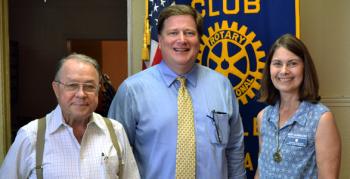
Program director Dr. Bo McNeely, left, and Rotary Club of Crowley President Mary Zaunbrecher, right, thanked Louis Buatt for his informative presentation on hydraulic fracturing during Rotary Club’s weekly meeting Tuesday.
Rotarians learn more about hydraulic fracturing
Jeannine LeJeune is the online editor for the Crowley Post-Signal. She can be reached at jeannine.lejeune@crowleytoday.com or 337-783-3450.
In Louisiana, there’s no industry like the oil and gas industry.
Tuesday, at the Rotary Club of Crowley’s weekly meeting, Louis Buatt looked to provide perspective on the industry and, in particular, the volatile issue of hydraulic fracturing.
Hydraulic fracturing, commonly known as hydrofracking or fracking, is a technique for well-stimulation where rock is fractured by a hydraulically pressurized liquid made of water, sand, and chemicals.
Buatt, a member of the law firm Liskow & Lewis, prefaced his discussion with the fact that the firm does represent oil and gas entities, but explained that his talk looked to clear up misinformation and be as even as possible.
The primarily informational talk centered on the ins and outs of hydrofacking as well as its impact on the economy.
Buatt brought up how hydrofracking, along with horizontal drilling and shales have helped boost the United States’ domestic energy sector. While the country has grown its own production, it has become the top producing country in natural gas and is on pace to become the world’s top producer of oil (it currently sits at number three) within the coming years.
It hasn’t been all good news for the industry of late, however, as lower gas prices and an over abundance of natural gas has led to lower gas prices. Of course, as Buatt pointed out, that being “a bad thing” is a matter of perspective.
On the other side of the coin, however, has been petro-chemical businesses reconstituting in the country, with many aiming their sights on Louisiana, that is set to lead to more jobs, wages and economic productivity being available for Louisiana, a factoid not lost on Buatt.
“It’s incredible what the keys of hydraulic fracturing and horizontal drilling have given the state,” he said.
To close his discussion, Buatt focused on the environmental concerns raised about hydrofacking and again talked reality versus perception.
Realistically, there are concerns with water acquisition and well injection in the process, though Buatt cautioned that, particularly with well injections, the concerns are typically exaggerated.
Meanwhile, concerns over chemical mixing, flowback and wastewater are typically perceived as there are no more real concerns now than there were with conventional drilling methods.
- Log in to post comments
